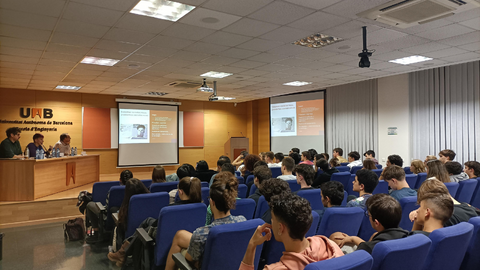Artificial Intelligence students receive training in protecting rights of migrants
On Wednesday 9 November, the board room of the UAB School of Engineering held a seminar for students to work on the risks and opportunities offered by Artificial Intelligence to protect the rights of migrants and people of colour.

The FAS's refugee welcome programme organised a seminar entitled “IA i Fronteres” [AI and Borders] for students of the UAB bachelor's degree in Artificial Intelligence which helped them analyse and reflect upon the risks Artificial Intelligence (AI) has in reproducing discriminations, but also in its ability to protect human rights and pomote global justice.
In a world becoming increasingly automated, AI may be one of the most crucial tools needed to respond to social challenges, and this implies having an enormous amount of technological power to effect the rights and liberties of citizens. Undoubtedly, AI has the potential to improve the well-being of people. At the same time, algorithmic results can perpetuate structural discriminations.
The seminar include three round tables with experts on human rights and technology who spoke on algorithmic governance, technocolonialism and anti-racism. Participating in the debates were Judith Membrives (LaFede.cat), Andreu Belsunces (UOC), Karlos Castilla (IDHC), Paula Guerra (AlgoRace) and Carlos Lancho (University of Navarra). The seminar then concluded with an open debate with students on the opportunities and challenges posed when designing an AI for Global Justice.
Report on digital racism
In this sense, the Fundació Autònoma Solidària, the Computer Vision Centre and the international institution Novact drafted the report entitled “Racisme Digital i COVID-19. Discursos racistes i antiracistes a Twitter durant la pandèmia” [Digital Racism and COVID-19. Racist and anti-racist comments on Twitter during the pandemic], which received an award from the Catalan Association of Artificial Intelligence in the category of Social Good. The study revealed in detail how hate discourses were created on Twitter to attack migrants and people of colour under the context of the pandemic in Spain and Catalonia. The report pointed out how AI could be put to use to defend the rights of these groups.